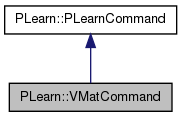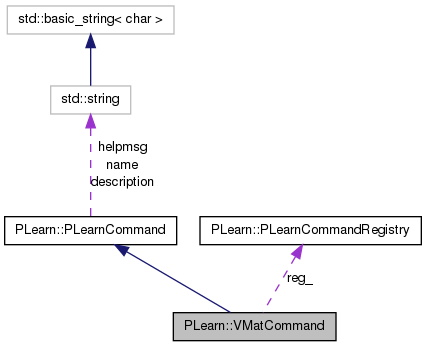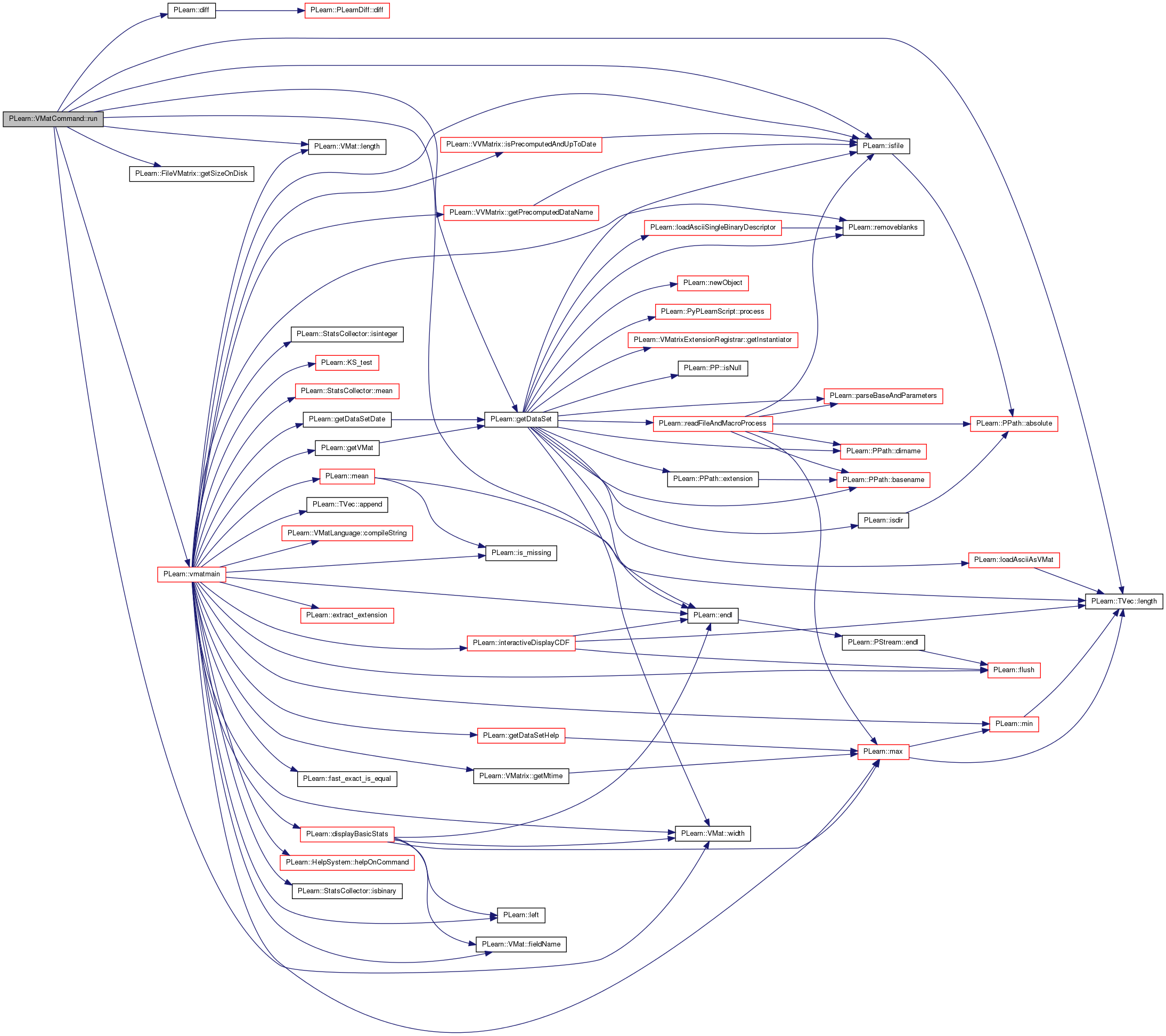|
PLearn 0.1
|
|
PLearn 0.1
|
#include <VMatCommand.h>


Public Member Functions | |
| VMatCommand () | |
| virtual void | run (const vector< string > &args) |
| The actual implementation of the 'VMatCommand' command. | |
Static Protected Attributes | |
| static PLearnCommandRegistry | reg_ |
| This allows to register the 'VMatCommand' command in the command registry. | |
Definition at line 50 of file VMatCommand.h.
| PLearn::VMatCommand::VMatCommand | ( | ) |
Definition at line 55 of file VMatCommand.cc.
:
PLearnCommand(
"vmat",
"Examination and manipulation of vmat datasets",
"Usage: vmat info <dataset>... \n"
" Will info about dataset (size, etc..)\n"
" or: vmat fields <dataset> [name_only] [transpose] \n"
" To list the fields with their names (if 'name_only' is specified, the indexes won't be displayed,\n"
" and if 'transpose' is also added, the fields will be listed on a single line)\n"
" or: vmat fieldinfo <dataset> <fieldname_or_num> [--bin]\n"
" To display statistics for that field \n"
" or: vmat bbox <dataset> [<extra_percent>] \n"
" To display the data bounding box (i.e., for each field, its min and max, possibly extended by +-extra_percent ex: 0.10 for +-10% of the data range )\n"
" or: vmat cat <dataset>... [--precision=N] [<optional_vpl_filtering_code>]\n"
" To display the dataset \n"
" or: vmat sascat <dataset.vmat> <dataset.txt>\n"
" To output in <dataset.txt> the dataset in SAS-like tab-separated format with field names on the first line\n"
" or: vmat view <dataset>...\n"
" Interactive display to browse on the data. \n"
" ( will work only if your executable includes commands/PLearnCommands/VMatViewCommand.h )\n"
" or: vmat stats <dataset> \n"
" Will display basic statistics for each field \n"
" or: vmat convert <source> <destination> [--cols=col1,col2,col3,...] [--mat_to_mem] [--save_vmat] [--force_float]\n"
" To convert any dataset into a .amat, .pmat, .dmat, .vmat, .csv or .arff format. \n"
" The extension of the destination is used to determine the format you want. \n"
" WARNING: In dmat format, all double are currently casted to float!\n"
" If the option --cols is specified, it requests to keep only the given columns\n"
" (no space between the commas and the columns); columns can be given either as a\n"
" number (zero-based) or a column name (string). You can also specify a range,\n"
" such as 0-18, or any combination thereof, e.g. 5,3,8-18,Date,74-85\n"
" If the option --mat_to_mem is specified, we load the original matrix into memory\n"
" If the option --save_vmat is specified, we save the source vmat in the destination metadatadir\n"
" If the option --update is specified, we generate the <destination> only when the <source> file is newer\n"
" then the destination file or when the destination file is missing\n"
" If .pmat is specified as the destination file, the option --force_float will save the data in float format\n"
" If .csv (Comma-Separated Value) is specified as the destination file, the \n"
" following additional options are also supported:\n"
" --skip-missings: if a row (after selecting the appropriate columns) contains\n"
" one or more missing values, it is skipped during export\n"
" --precision=N: a maximum of N digits is printed after the decimal point\n"
" --delimiter=C: use character C as the field delimiter (default = ',')\n"
" --convert-date: first column is assumed to be in CYYMMDD format; it is\n"
" exported as YYYYMMDD in the .csv file (19000000 is added)\n"
" If .arff (Attribute-Relation File Format) is specified as the destination file, the \n"
" following additional options are also supported:\n"
" --skip-missings: if a row (after selecting the appropriate columns) contains\n"
" one or more missing values, it is skipped during export\n"
" --precision=N: a maximum of N digits is printed after the decimal point\n"
" --date-cols=col1,col2,...: we flag the specified columns as a date\n"
" we also convert the date from CYYMMDD to YYYYMMDD (if necessary)\n"
" or: vmat gendef <source> [binnum1 binnum2 ...] \n"
" Generate stats for dataset (will put them in its associated metadatadir). \n"
" or: vmat genvmat <source_dataset> <dest_vmat> [binned{num} | onehot{num} | normalized]\n"
" Will generate a template .vmat file with all the fields of the source preprocessed\n"
" with the processing you specify\n"
" or: vmat genkfold <source_dataset> <fileprefix> <kvalue>\n"
" Will generate <kvalue> pairs of .vmat that are splitted so they can be used for kfold trainings\n"
" The first .vmat-pair will be named <fileprefix>_train_1.vmat (all source_dataset except the first 1/k)\n"
" and <fileprefix>_test_1.vmat (the first 1/k of <source_dataset>\n"
" or: vmat diff <dataset1> <dataset2> [<tolerance> [<verbose>]]\n"
" Will report all elements that differ by more than tolerance (default = 1e-6),\n"
" in an absolute way for numbers less than 1, and in a relative way otherwise.\n"
" If verbose==0 then print only total number of differences.\n"
" or: vmat cdf <dataset> [<dataset> ...] \n"
" To interactively display cumulative density function for each field \n"
" along with its basic statistics \n"
// " or: vmat cond <dataset> <condfield#> \n"
// " Interactive display of coditional statistics conditioned on the \n"
// " conditioning field <condfield#> \n"
" or: vmat diststat <dataset> <inputsize>\n"
" Will compute and output basic statistics on the euclidean distance \n"
" between two consecutive input points \n"
" or: vmat dictionary <dataset>\n"
" Will create <dataset>.field#.dict, where # is the\n"
" field (column) number, starting at 0. Those files contain the plearn\n"
" scripts of the Dictionary objets for each field.\n"
" or: vmat catstr <dataset>\n"
" Will output the content of <dataset>, using its string mappings\n"
" or: vmat compare_stats <dataset1> <dataset2> [stdev threshold] [missing threshold]\n"
" Will compare stats from dataset1 to dataset2\n\n"
" or: vmat compare_stats_ks <dataset1> <dataset2> [--mat_to_mem]\n"
" Will compare stats from dataset2 to dataset2 with "
" Kolmogorov-Smirnov 2 samples statistic\n\n"
" or: vmat mtime <dataset>\n"
" Print the mtime of a dataset\n"
" or: vmat pmat_float_save <dataset>...\n"
" Print the size of the new pmat file in float format, the size of saved bytes, the maximum value difference, the maximum relative difference in value and the column of the maximum value and maximum relative value."
"<dataset> is a parameter understandable by getDataSet: \n"
+ getDataSetHelp()
)
{}
| void PLearn::VMatCommand::run | ( | const vector< string > & | args | ) | [virtual] |
The actual implementation of the 'VMatCommand' command.
Implements PLearn::PLearnCommand.
Definition at line 150 of file VMatCommand.cc.
References PLearn::diff(), PLearn::endl(), PLearn::getDataSet(), PLearn::FileVMatrix::getSizeOnDisk(), i, PLearn::isfile(), j, PLearn::VMat::length(), PLearn::TVec< T >::length(), n, PLCHECK, PLERROR, PLWARNING, PLearn::vmatmain(), and PLearn::VMat::width().
{
// new vmat sub-commands
string command = args[0];
if(command=="bbox")
{
string dataspec = args[1];
real extra_percent = 0.00;
if(args.size()==3)
extra_percent = toreal(args[2]);
VMat vm = getDataSet(dataspec);
TVec< pair<real, real> > bbox = vm->getBoundingBox(extra_percent);
for(int k=0; k<bbox.length(); k++)
cout << bbox[k].first << " : " << bbox[k].second << endl;
}
else if (command == "view")
{
// The 'view' command has been moved to VMatViewCommand (to avoid
// a forced dependency on the curses library).
vector<string> new_args(args.size() - 1);
for (size_t i = 1; i < args.size(); i++)
new_args[i - 1] = args[i];
PLearnCommandRegistry::run("vmat_view", new_args);
}
else if (command == "pmat_float_save")
{
#ifdef USEFLOAT
PLERROR("vmat pmat_float_save don't work correctly when compiled in float.");
#endif
PLCHECK(args.size()>1);
for(uint f=1;f<args.size();f++){
PPath dataspec = args[f];
if(!isfile(dataspec)){
PLWARNING("%s is not a file!",dataspec.c_str());
continue;
}
VMat vm = getDataSet(dataspec);
int64_t orig_size = vm->getSizeOnDisk();
int saved_size=-1;
int new_size=-1;
if(orig_size!=-1){
FileVMatrix n = FileVMatrix(dataspec+"dummy",vm.length(),vm.width(),true,false);
new_size=n.getSizeOnDisk();
saved_size=orig_size-new_size;
}
Vec v(vm->width());
double max_diff=0;
double max_rel_diff=0;
int col_max = -1;
int col_max_rel = -1;
for(int i=0;i<vm->length();i++){
vm->getRow(i,v);
for(int j=0;j<vm->width();j++){
double diff = v[j]-float(v[j]);
if(max_diff<diff){
max_diff=diff;
col_max = j;
}
double rel_diff = diff/v[j];
if(max_rel_diff<rel_diff){
max_rel_diff=rel_diff;
col_max_rel = j;
}
}
}
cout<<"new_size="<<new_size<<" saved_size="<< saved_size <<" max_difference="<< max_diff <<" max_relatif_difference="<<max_rel_diff<<" col_max="<<col_max<<" col_max_rel="<<col_max_rel<<endl;
}
}
else
{
// Dirty hack to plug into old vmatmain code
// Eventually, should get vmatmain code in here and clean
int argc = (int)args.size()+1;
char** argv = new char*[argc];
string commandname = "vmat";
argv[0] = const_cast<char*>(commandname.c_str());
for(int i=1 ; i<argc; i++)
argv[i] = const_cast<char*>(args[i-1].c_str());
vmatmain(argc, argv);
delete[] argv;
}
}

PLearnCommandRegistry PLearn::VMatCommand::reg_ [static, protected] |
This allows to register the 'VMatCommand' command in the command registry.
Definition at line 57 of file VMatCommand.h.
 1.7.4
1.7.4